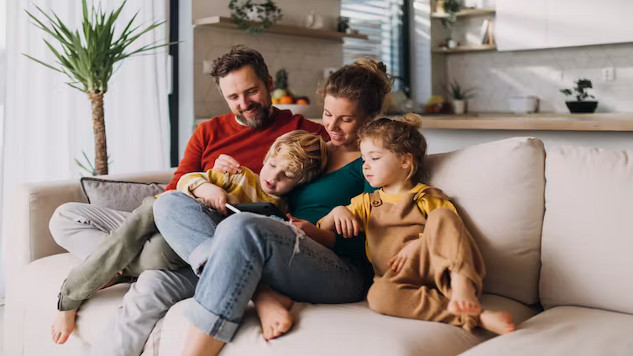
Warm, supportive caregiving can help counteract the effects of stress during childhood and development. Halfpoint Images/Moment via Getty Images
Warm and supportive parenting may buffer against the effects of stress during childhood and adolescence. That is the key takeaway of our recent study, published in the journal PNAS Nexus.
Some children and adolescents who experience stressful events such as physical abuse or neglect have less tissue in a brain region called the hippocampus. The hippocampus plays a critical role in learning and memory and is also highly susceptible to stress.
However, in our study, we did not find a link between increased stress and reduced brain tissue in the hippocampus for young people who reported more warmth from their caregivers.
Positive parenting includes a range of warm and supportive techniques such as providing praise for doing something well, emotional support and affection. Contrast this with harsh parenting techniques, such as shouting and physical punishments.
As a first step, we explored whether positive parenting protected against a connection between childhood stress and behavioral problems in children.
We analyzed brain scans of almost 500 children between 10 and 17 years old using data from a project called the Healthy Brain Network. We measured brain tissue using structural magnetic resonance imaging, or MRI, a technique that allows us to look at the size of brain regions. To measure stress, we asked children about the number of negative life events they had experienced across family, community and school contexts and how distressed each of those events made them.
Results showed that positive parenting had protective effects against the connection between stress and behavior; in other words, children who had experienced more distress from negative events, but who also perceived their parents as being warm and supportive, exhibited less challenging behavior such as rule-breaking or aggression. We next examined how parenting buffered against a known biomarker of stress in the brain: less tissue in the hippocampus.
Consistent with prior research, we found that more childhood stress correlated with smaller hippocampal volumes. However, we found that children’s perception of having received positive, supportive parenting served as a buffer against the biological effects of stress. Even when young people reported high levels of distress from negative life events, those who perceived their parents as more supportive did not have reduced brain tissue in the hippocampus.
In contrast, we did not find this same protective effect when we looked at what caregivers thought of their parenting. In other words, if parents said they were supportive and positive in their parenting but the child didn’t see them that way, we did not see this protective effect.
Why it matters
Past research has found that the hippocampus is smaller in children and adults exposed to high levels of stress in childhood. These smaller volumes are in turn associated with behavioral problems, learning and memory challenges and increased vulnerability to future stress.
Our study highlights the importance of nurturing parenting in promoting healthy brain development and resilience in children. By fostering an environment of warmth and support, caregivers can help children cope with stress more effectively. Dozens of studies have found that positive parenting practices – such as helping children name emotions and providing a space for them to disclose feelings without judgment – can help kids get through difficult events.
What other research is being done
Our team’s work and that of others underscores that stressful experiences can have a detrimental impact on development. Many researchers are trying to understand which aspects of stress matter and how.
For example, experiences that are threatening, like violence, may influence the brain and behavior differently from experiences of deprivation, like not having enough food.
At the same time, while researchers think that certain types of stress have particular characteristics, the person experiencing the stress may not feel that way. That is, not having enough food might feel very threatening to the person going through it. Our study indicates that it is critical to center the perspectives of those directly affected by the stress in this area of research.![]()
About The Author
Jamie Hanson, Assistant Professor of Psychology, University of Pittsburgh and Isabella Kahhalé, PhD student in Clinical and Developmental Psychology, University of Pittsburgh
This article is republished from The Conversation under a Creative Commons license. Read the original article.

Related Books:
Here are 5 non-fiction books on parenting that are currently Best Sellers on Amazon.com:The Whole-Brain Child: 12 Revolutionary Strategies to Nurture Your Child's Developing Mind
by Daniel J. Siegel and Tina Payne Bryson
This book provides practical strategies for parents to help their children develop emotional intelligence, self-regulation, and resilience using insights from neuroscience.
Click for more info or to order
No-Drama Discipline: The Whole-Brain Way to Calm the Chaos and Nurture Your Child's Developing Mind
by Daniel J. Siegel and Tina Payne Bryson
The authors of The Whole-Brain Child offer guidance for parents to discipline their children in a way that promotes emotional regulation, problem-solving, and empathy.
Click for more info or to order
How to Talk So Kids Will Listen & Listen So Kids Will Talk
by Adele Faber and Elaine Mazlish
This classic book provides practical communication techniques for parents to connect with their children and foster cooperation and respect.
Click for more info or to order
The Montessori Toddler: A Parent's Guide to Raising a Curious and Responsible Human Being
by Simone Davies
This guide offers insights and strategies for parents to implement Montessori principles at home and foster their toddler's natural curiosity, independence, and love of learning.
Click for more info or to order
Peaceful Parent, Happy Kids: How to Stop Yelling and Start Connecting
by Dr. Laura Markham
This book offers practical guidance for parents to shift their mindset and communication style to foster connection, empathy, and cooperation with their children.
Click for more info or to order























